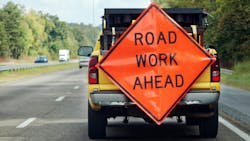You can tell what time of year it is by the projects you are working on or the events around the corner. Truckload Carrier Association’s Call on Washington and the start of football season in September reminds me that fall is approaching. It seems like the Summer Olympics just ended, yet the leaves will soon change (or might have already started, depending on where you’re reading this).
Like setting a clock, elections are just weeks away, and it being a presidential year, it feels especially significant. The only thing that makes this time of year a little different is that we will soon be diving back into the discussion of highway reauthorization.
For those who don’t know, highway reauthorization, aka the highway bill, the infrastructure bill, or even the current Infrastructure Investment & Jobs Act—whatever you want to call it—expires in September 2026. Just as we got used to the IIJA, the calendar threw a wrench into the plan; it is just about time to start talking about the next one.
Despite a never-ending tumble of reauthorization bills, aspects of the Fixing America's Surface Transportation Act, or FAST Act, still haven't become a reality since becoming law nine years ago (hair follicle testing as an alternative measure for DOT drug-testing protocols, for example).
Remember SAFETY-LU, MAP-21, and the FAST Act? The list goes on and on. Other than naming one of these large pieces of omni-type legislation, conversations are already underway as to what the next one will look like. Certainly, those conversations will look at the most recent Congress to target some bills introduced in this current session and reintroduce them in 2025.
This is precisely why issues like truck parking continue to be discussed—to ensure that improving upon the issue stays at the forefront of conversation and finds its way into legislation that needs to be enacted.
Think about the importance of the next infrastructure bill. The IIJA provided $110 billion toward repairing, rebuilding, and constructing new roads and bridges for a nation that consistently received failing grades for its crumbling infrastructure system. That $110 billion would seemingly go a long way toward paving the way into the next century for an interstate system that needed upgrades.
See also: NTEA, SEMA sue to stop CARB's Advanced Clean Fleets
In recognizing what a large chunk of money the $110 billion is, would it surprise anyone to know that our nation needs almost $1 trillion more for our industry to deliver freight across the country productively? The Environmental Protection Agency and California Air Resources Board established an aggressive timeline for adopting zero-emission commercial trucks.
Looking at the price tags, the next infrastructure bill may need a “lottery investment” aspect that calls for government agencies to buy lottery tickets. While I am being sarcastic here, even the most popular drawings don’t come close to the price tag forecast for building a realistic electric infrastructure for heavy-duty, battery-powered vehicles.
Funding our nation’s infrastructure will be a major focus going into the next congressional session. First-class roads and bridges are paramount for our drivers who move the nation’s freight, and in this day and age, questions are abundant about the dollars that can be dedicated to doing that. In addition, EVs mean less fuel tax revenue, so we need to figure out future funding.
Make no mistake, the election is fast approaching. Regardless of the outcome in the congressional races or the bid for the White House, TCA will continue to work with both parties in an effort to have our priorities placed at the front of the line when it comes to the next highway bill. The playing field is wide open for potential legislation to be introduced or reintroduced, enabling your voice to be heard loud and clear over the coming months.
About the Author
David Heller
David Heller is the senior vice president of safety and government affairs for the Truckload Carriers Association. Heller has worked for TCA since 2005, initially as director of safety, and most recently as the VP of government affairs. Before that, he spent seven years as manager of safety programs for American Trucking Associations.

